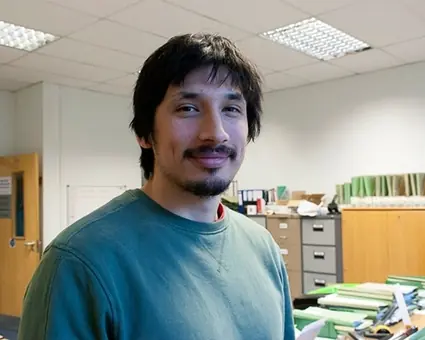
Laura E Haynes
PGR Students
Laura's professional career has largely been within water companies as a scientist focusing on water quality maintenance. Laura originally began her career in a laboratory environment, examining water samples for pathogenic microbial and chemical contamination. She then moved into a regulatory role examining the causes of water quality failures, mitigating the impacts to public health and designing preventative measures.
Laura’s academic background began with a Bachelor of Science (Hons) degree in Zoology at the University of Nottingham (2005-2008), where she was able to build upon her interests in species conservation, ecology and behaviour. She conducted her undergraduate dissertation project on the crop raiding behaviour of threatened Buton macaques (Macaca ochreata brunnescens). The project investigated the damage caused by these animals on crop species and utilised the behavioural data collected of raiding activity to both protect the livelihoods of the farmers cohabiting with the macaques as well as reduce the negative implications of the crop protection methods used to deter the macaques.
Laura completed a Master’s degree (2010-2011) at the University of Exeter, focusing her dissertation project on determining the effect of a neonicotinoid insecticide on learning and memory in honeybees (Apis mellifera). This sparked her interest in the potentially damaging toxicity of pesticides on beneficial insects and how this can drastically impact ecosystem services through sublethal effects.
This interest in beneficial insect preservation and the importance for overall ecosystem functioning, led Laura to want to begin a PhD in this area. Laura was then accepted onto a PhD programme at the Natural Resources Institute at the University of Greenwich, examining the impact of multimodal biopesticides on beneficial insects. The aim of the project is to determine the lethal and sub-lethal impact of individual and combinational biopesticides on non-target agroecologically beneficial insects.
Primary Supervisor

Dr G. Mandela Fernandez-Grandon
Research Fellow in Behavioural Entomology
Secondary Supervisor(s)

Professor Philip C Stevenson
Professor of Plant Chemistry and Head of Chemical Ecology and Plant Biochemistry Group
Thesis Title
Impacts of Novel Multimodal Biopesticides on Beneficial Insects
Project Description
Laura Haynes joined the Natural Resources Institute at the University of Greenwich in October 2019 as a PhD research student.
Laura’s research interests lie in ecotoxicology and specifically the impact of pesticides on the behavioural ecology of non-target agroecological beneficial insects such as pollinators and the natural enemies of crop pests. The utilisation of biopesticides such as botanical insecticides and entomopathogenic fungi to replace synthetic pesticide use in crop protection is a particular interest of research to provide a more sustainable methodology in Integrated Pest Management (IPM) systems.
Certain botanical extracts from plants can be utilised as insecticides and combinational usage with other biopesticides, such as entomopathogenic fungi, can increase pest control outcomes through synergistic action and therefore reduced concentrations required to maintain effectivity. This not only aims to reduce pest numbers with reduced environmental impact, but also enables a potential solution to insecticide resistance through differing modes of action utilised.
Effective use of these biopesticides in pest control may be restricted by negative impacts on agriculturally beneficial insects such as pollinators and natural enemies. The determination of any lethal and sub-lethal effects of these biopesticides, both alone and in combinational usage, on agroecological beneficial insects is a particular research focus for the project. Disentangling the physiological mechanisms behind any toxicity effects is also a keen area of interest for development, and will help to determine any potential mitigation of negative effects.
Laura is a member of the Royal Entomological Society.
Laura's professional career has largely been within water companies as a scientist focusing on water quality maintenance. Laura originally began her career in a laboratory environment, examining water samples for pathogenic microbial and chemical contamination. She then moved into a regulatory role examining the causes of water quality failures, mitigating the impacts to public health and designing preventative measures.
Laura’s academic background began with a Bachelor of Science (Hons) degree in Zoology at the University of Nottingham (2005-2008), where she was able to build upon her interests in species conservation, ecology and behaviour. She conducted her undergraduate dissertation project on the crop raiding behaviour of threatened Buton macaques (Macaca ochreata brunnescens). The project investigated the damage caused by these animals on crop species and utilised the behavioural data collected of raiding activity to both protect the livelihoods of the farmers cohabiting with the macaques as well as reduce the negative implications of the crop protection methods used to deter the macaques.
Laura completed a Master’s degree (2010-2011) at the University of Exeter, focusing her dissertation project on determining the effect of a neonicotinoid insecticide on learning and memory in honeybees (Apis mellifera). This sparked her interest in the potentially damaging toxicity of pesticides on beneficial insects and how this can drastically impact ecosystem services through sublethal effects.
This interest in beneficial insect preservation and the importance for overall ecosystem functioning, led Laura to want to begin a PhD in this area. Laura was then accepted onto a PhD programme at the Natural Resources Institute at the University of Greenwich, examining the impact of multimodal biopesticides on beneficial insects. The aim of the project is to determine the lethal and sub-lethal impact of individual and combinational biopesticides on non-target agroecologically beneficial insects.
Primary Supervisor

Dr G. Mandela Fernandez-Grandon
Research Fellow in Behavioural Entomology
Secondary Supervisor(s)

Professor Philip C Stevenson
Professor of Plant Chemistry and Head of Chemical Ecology and Plant Biochemistry Group
Thesis Title
Impacts of Novel Multimodal Biopesticides on Beneficial Insects
Project Description
Laura Haynes joined the Natural Resources Institute at the University of Greenwich in October 2019 as a PhD research student.
Laura’s research interests lie in ecotoxicology and specifically the impact of pesticides on the behavioural ecology of non-target agroecological beneficial insects such as pollinators and the natural enemies of crop pests. The utilisation of biopesticides such as botanical insecticides and entomopathogenic fungi to replace synthetic pesticide use in crop protection is a particular interest of research to provide a more sustainable methodology in Integrated Pest Management (IPM) systems.
Certain botanical extracts from plants can be utilised as insecticides and combinational usage with other biopesticides, such as entomopathogenic fungi, can increase pest control outcomes through synergistic action and therefore reduced concentrations required to maintain effectivity. This not only aims to reduce pest numbers with reduced environmental impact, but also enables a potential solution to insecticide resistance through differing modes of action utilised.
Effective use of these biopesticides in pest control may be restricted by negative impacts on agriculturally beneficial insects such as pollinators and natural enemies. The determination of any lethal and sub-lethal effects of these biopesticides, both alone and in combinational usage, on agroecological beneficial insects is a particular research focus for the project. Disentangling the physiological mechanisms behind any toxicity effects is also a keen area of interest for development, and will help to determine any potential mitigation of negative effects.
Laura is a member of the Royal Entomological Society.
